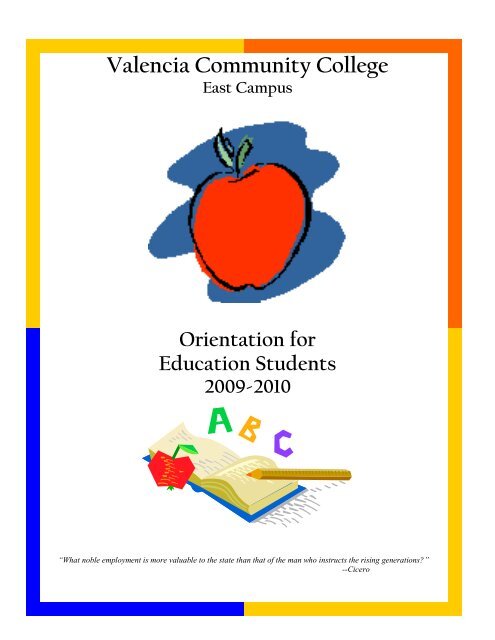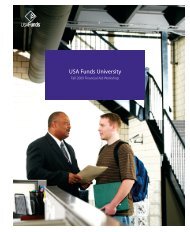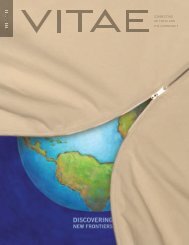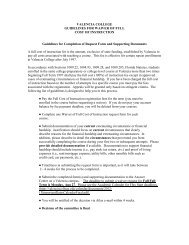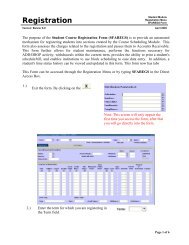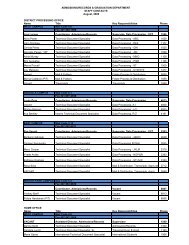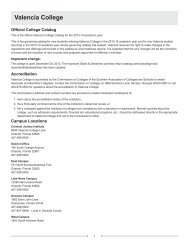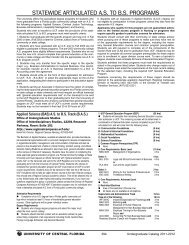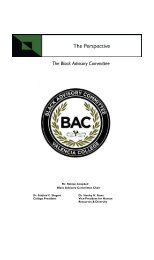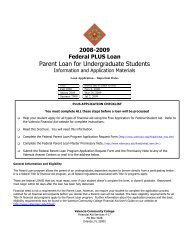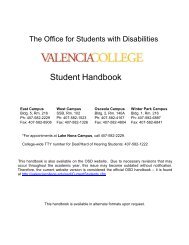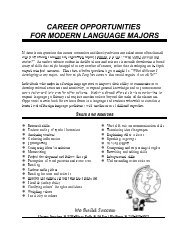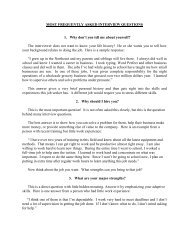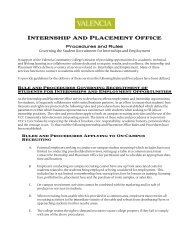Download Education Handbook - Valencia College
Download Education Handbook - Valencia College
Download Education Handbook - Valencia College
Create successful ePaper yourself
Turn your PDF publications into a flip-book with our unique Google optimized e-Paper software.
<strong>Valencia</strong> Community <strong>College</strong><br />
East Campus<br />
Orientation for<br />
<strong>Education</strong> Students<br />
2009-2010<br />
“What noble employment is more valuable to the state than that of the man who instructs the rising generations?”<br />
--Cicero
Table of Contents<br />
A Teacher 3<br />
Student Orientation Letter 4<br />
Pre Major <strong>Education</strong>, <strong>Valencia</strong> AA Degree course requirements 5<br />
<strong>Education</strong> Courses offered at <strong>Valencia</strong> Community <strong>College</strong> 6<br />
University of Central Florida 2+2 Program 6<br />
Frequently asked questions 7<br />
<strong>Valencia</strong> Community <strong>College</strong> (Core Courses for <strong>Education</strong> Majors) 9<br />
Important Tips for Field Observation 11<br />
Steps needed to start field observations at Orange County Public Schools 12<br />
Additional information of importance related to field observations 13<br />
Volunteer Guidelines 14<br />
Student Affidavit & Certification of Student Observations 17<br />
Verification Forms of Student Observations 18<br />
Portfolio Information 21<br />
Portfolio Rubric (EDF 2085) 22<br />
Portfolio Rubric (EDF 2005) 26<br />
<strong>Valencia</strong> Futures Educators 30<br />
Teacher‟s Cartoon 31<br />
Revised July 2009<br />
2
A Teacher<br />
When I consider all the things for which<br />
I am thankful – my life, my family, my health, friends.<br />
The freedom to be an American, and the beauty of<br />
The world in which I live, I know also<br />
That I am deeply grateful for my profession.<br />
I have the most important job in the world –<br />
I am a teacher.<br />
I am sometimes awestruck by the responsibility<br />
Placed within my hands<br />
To teach the future citizens of this world<br />
Before me in my classroom sit<br />
Future scholars, philosophers, poets and architects,<br />
Writers, doctors, craftsmen future parents.<br />
Waiting and trusting that I will help<br />
To guide them, and give them the skills needed<br />
To live in the future world.<br />
Some days I am discouraged, frustrated, overworked.<br />
Or angry because of all the demands placed upon me.<br />
It only takes a quite time of reflection, though.<br />
For me to remember how deeply proud and grateful<br />
I am to be a teacher<br />
Many years from now<br />
When I’m no longer here<br />
It is my hope that men and women<br />
Will be thankful for their lives.<br />
Their health and friends<br />
The freedom to be an American<br />
And the beauty of the world<br />
In which they live.<br />
And perhaps will live a bit<br />
Better and with greater joy because<br />
I was their teacher.<br />
“A vision without action is but a dream; action without vision is a waste of time; but vision with action can change our live s.”<br />
• Ignacio Tinajero, 1995 Teacher of the Year<br />
•<br />
3
Dear Student Teacher:<br />
Welcome to the Teaching Profession! We are pleased that you have chosen a very noble and<br />
respectable career. Although teaching is a very challenging and demanding profession, it will be<br />
an enjoyable and rewarding experience if you are well prepared for it.<br />
A lot of effort and time has been has been put into the preparation of this handbook. The<br />
handbook was specifically developed for YOU in order to assist you with getting better prepared<br />
for the upcoming semesters at <strong>Valencia</strong> Community <strong>College</strong> and to be a successful teacher. The<br />
handbook is based on the frequently asked questions of students entering a teacher preparation<br />
program and covers issues regarding choosing an observation site, making contact with the<br />
school, paperwork to be completed, background check and finger printing, preparing the<br />
portfolio, membership in the teachers club and professional networking and conferences. This<br />
handbook is the road map to your success, so please read it carefully and thoroughly.<br />
At <strong>Valencia</strong> Community <strong>College</strong> you may choose to earn an Associate in Arts (A.A.) degree<br />
with a Pre-Major in <strong>Education</strong> or you may choose to take the three pre-requisite education<br />
courses to transfer to a Florida public university system‟s <strong>Education</strong> Baccalaureate Program.<br />
Those courses are: EDF 2005 (Introduction to the Teaching Profession), EDF 2085 (Introduction<br />
to Diversity for Educators), and EME 2040 (Introduction to Technology for Educators). A list of<br />
courses offered at <strong>Valencia</strong> Community <strong>College</strong> is included in this handbook, but make sure you<br />
refer to the schedule of courses offered as all of the courses listed in this handbook may not be<br />
offered every semester. Also included in this handbook is a list of courses required by the<br />
University of Central Florida.<br />
To enable you to successfully complete the pre-requisites for an <strong>Education</strong> degree, we<br />
recommend that you understand clearly the requirements of these classes. Two of the above<br />
education classes EDF 2005 & EDF 2085 each require an out of class field experience of 15<br />
hours (a total of 30 hours) in a K-12 public school setting. Prior teaching experience or<br />
volunteer service will not count as part of your field observations. You will also be required<br />
to compile a portfolio for each of the three education courses.<br />
In order for you to better benefit from the field observations, we recommend that you enroll in<br />
these two courses during separate academic terms. This will allow you more time to reflect on<br />
the classroom experiences, the observations, and your future as an educator. Spreading out these<br />
courses will also eliminate the pressures and stresses related to completing the required 30 hours<br />
of classroom observations and multiple portfolios during a single term. Please note that the field<br />
observations are a state requirement and instructors do not have the liberty to override or<br />
minimize them.<br />
We wish you the best in your future endeavors. If you have any further questions about the<br />
<strong>Education</strong> program, please do not hesitate to contact me at 407-582-2624, the Social Sciences<br />
Department at 407-582-2443, or e-mail me at yqadri@valenciacc.edu.<br />
Sincerely,<br />
Dr. Yasmeen Qadri<br />
<strong>Education</strong> Coordinator, <strong>Valencia</strong> Community <strong>College</strong><br />
4
<strong>Valencia</strong> Community <strong>College</strong><br />
Pre-Major: <strong>Education</strong> (General Preparation)<br />
Associate in Arts Degree<br />
This Pre-Major is designed for the student who plans to transfer to a Florida public<br />
university like the University of Central Florida as a junior to complete a four-year bachelor‟s<br />
degree in <strong>Education</strong>. Students must meet with an advisor to discuss requirements for<br />
concentrations in specific fields. Students who plan to transfer to a limited access program are<br />
responsible for completing the specific requirements of the institution to which they will transfer<br />
as completion of this Pre-Major does not guarantee admission to an upper division limited<br />
access program. Students are strongly encouraged to take electives that relate to their intended<br />
baccalaureate degree program.<br />
Students in Pre-Majors must complete all required college preparatory courses,<br />
prerequisites for the listed course requirements, and <strong>Valencia</strong>‟s foreign language proficiency<br />
requirement. Courses meeting the preceding requirements may be in addition to the 60 credit<br />
hours listed. The courses do not have to be taken in the order listed; the sequence suggested is<br />
based upon prerequisites and level of course difficulty for most students. Please check the<br />
current college catalog and seek assistance from college academic advisors when designing your<br />
program of study.<br />
FOUNDATION COURSES<br />
ENC 1101 Freshman Composition I (Gordon Rule)<br />
PHI 2010 Philosophy (Humanities)<br />
EDF 2005 Introduction to the Teaching Profession<br />
Mathematics (Gordon Rule)<br />
SPC 1600 Fundamentals of Speech<br />
Science<br />
PSY 1012 General Psychology<br />
INTERMEDIATE COURSES<br />
ENC 1102 Freshman Composition II (Gordon Rule)<br />
Mathematics (Gordon Rule)<br />
Humanities HUM Prefix (Gordon Rule)<br />
EDF 2085 Introduction to Diversity for Educators<br />
POS 2041 U.S. Government<br />
AMH 2010 U. S. History to 1877<br />
ADVANCED COURSES<br />
EME 2040 Introduction to Technology for Educators<br />
ARH 2051 Introduction to Art History (Humanities)<br />
Science<br />
AMH 2020 U.S. History 1877 to Present<br />
Elective(s)<br />
Total Program Hours Required 60<br />
3 credits<br />
3 credits<br />
3 credits<br />
3 credits<br />
3 credits<br />
3 credits<br />
3 credits<br />
Total Hours 21<br />
3 credits<br />
3 credits<br />
3 credits<br />
3 credits<br />
3 credits<br />
3 credits<br />
Total Hours 18<br />
3 credits<br />
3 credits<br />
3 credits<br />
3 credits<br />
9 credits<br />
Total Hours 21<br />
5
<strong>Education</strong> Courses Offered at <strong>Valencia</strong> Community <strong>College</strong><br />
Please refer to the current course schedule in Atlas as the following courses may not be<br />
offered every semester.<br />
*EDF 2005 Introduction to the Teaching Profession 3 Credits<br />
*EDF 2085 Introduction to Diversity of Educators 3 Credits<br />
*EME 2040 Introduction to Technology for Educators 3 Credits<br />
ARE 2000 Art & Creativity 3 Credits<br />
EEC 2001 Introduction to Early Childhood Ed. 3 Credits<br />
EEX 2010 Orientation to Exceptional Ed. 3 Credits<br />
Special Topics in <strong>Education</strong><br />
EDG 2935 Assistive Technology<br />
EDG 2935 Effective Teachers: Professionalism in Teaching<br />
EDG 2935 Child Growth & Development<br />
EDG 2941 Internship in <strong>Education</strong><br />
EDG 2935 1 st and 2 nd Language Acquisition<br />
SLS 2940 Service Learning for <strong>Education</strong> Majors<br />
(Includes community service which may be in the area of the student‟s choice)<br />
3 Credits<br />
3 Credits<br />
3 Credits<br />
3 Credits<br />
1 & 3 Credits<br />
1 & 2 Credits<br />
University of Central Florida<br />
2+2 UNDERGRADUATE PROGRAM<br />
SPECIFIED COURSES<br />
The University of Central Florida offers the 2+2 program where students can complete their<br />
Associate of Arts (A.A.) or certain Associate of Science (A.S.) degrees at <strong>Valencia</strong> Community<br />
<strong>College</strong> and then continue at a UCF Regional Campus that provides seamless and convenient<br />
advancement to upper-level study and completion of a Bachelor‟s degree. Whether you are a<br />
first-year student or a student ready to enter your junior year, the partnership between <strong>Valencia</strong><br />
Community <strong>College</strong> and the University of Central Florida makes available an accredited public<br />
education so you are no longer limited by location and level of higher education. Students will<br />
continue to enjoy access to excellent faculty, professional advisers and staff, and an increasing<br />
array of courses and programs. For more information, visit the University of Central Florida‟s<br />
website at www.ucf.edu.<br />
6
Frequently Asked Questions<br />
Can I take all 3 pre-requisite education courses in the same semester?<br />
We do not recommend that students take the two courses that require 15 hours of field observations<br />
each, which will lead to 30 hours of out of class hours during the semester. Also, working on three<br />
portfolios at the same time may be stressful and demanding. It is advised that students take the<br />
Introduction to the Teaching Profession Course prior to Introduction to Diversity for Educators.<br />
Introduction to Technology for Educators can be taken along with either one of the above as it does<br />
not require field observation hours but requires a portfolio.<br />
What can I do to be a substitute teacher?<br />
You need a high school diploma to be a substitute and being one is highly recommended. Visit the<br />
websites of Orange and Seminole County Public Schools and fill the online application for becoming<br />
a substitute. The best part of being a substitute is that you can pick and choose the days you are<br />
available to teach and the schools at which you would like to teach. You will also get first hand<br />
experience and decide if teaching fits your needs and interests. Orange County Public Schools now<br />
has contract with Kelly <strong>Education</strong>al Staffing, an agency that facilitates the hiring process and training<br />
for substitutes. Information regarding Kelly Services can be found at<br />
http://www.kellyeducationalstaffing.us/eprise/main/web/us/customers/ocps/contact_us.<br />
How can I gain teaching experience while I am a student?<br />
Most schools look for volunteers to help with classroom operations. You can be a tutor, teacher‟s<br />
assistance, or help with grading or setting up the classroom. Any experience can greatly maximize<br />
your chance of getting that first teaching job. Remember, principals look not just for individuals who<br />
have A‟s on their transcripts, but also students who have classroom/teaching experience and a<br />
passion for teaching.<br />
If I am unable to register for courses due to a full time job or family obligations how can I<br />
complete my education to be a successful teacher?<br />
While the field observation requirements are mandatory for the two foundational courses and will<br />
require some time and sacrifice from other obligations to complete, <strong>Valencia</strong> Community <strong>College</strong><br />
offers a variety of methods of instruction to meet the needs of diverse students, working parents, at<br />
home moms, and full-time students. The following are some of the choices:<br />
1. Hybrid Courses (75% online and 25% on campus)<br />
2. Online Courses (100% online)<br />
3. Traditional (100% on campus)<br />
4. Weekend Courses, Evening Courses and Daytime Courses<br />
5. Flex Start (Courses start during the first 7 weeks, another set during the 2 nd seven weeks, etc.)<br />
What is a Hybrid course?<br />
Hybrid is the format of course delivery that combines the traditional classroom setting with out of<br />
class activities like videos, group assignments and online discussions all through WebCT assistance.<br />
With busy schedules and juggling their lives with jobs and family responsibilities, most of the<br />
students are relieved to be enrolled in the Hybrid courses as they do not have to be physically present<br />
on campus twice a week. Most Hybrid courses are offered as once a week meeting where students<br />
can meet their instructors face to face and ask questions and do group work with their peers; the<br />
remaining assignments can be done off campus as per their convenience. With the exception of the<br />
minimum computer skill requirements, students enrolling in hybrid courses should have nothing to<br />
fear about. In an age of technology where teachers are required to master the skills of using<br />
7
technology, students enrolled in hybrid courses will get the best of worlds when enrolled in a hybrid<br />
course.<br />
How would I do my field observations during the summer when schools are closed?<br />
Summer may be a good time to enroll in the education courses with fewer students but field<br />
observations may be challenging. Although a student may not begin field observations prior to the<br />
first day of classes, he/she can call the schools and begin the paper work and the scheduling process.<br />
Students will have to observe summer schools in session and cannot observe one to one instruction<br />
and tutoring sessions or day care centers.<br />
Can my work experience in a school count for my field observations?<br />
NO. Students are expected to observe other teachers and write reflections on their teaching practices.<br />
Your teaching cannot be counted as field observation hours nor your volunteer or substitute teaching<br />
hours.<br />
Can I do all 15 hours of field observations in the same school?<br />
NO. For the Introduction to the Teaching Profession course, students are required to complete their<br />
15 hours at 3 different levels, elementary, middle and high school and focus on effective teaching<br />
strategies, models of teaching, classroom management, and technology. For the Introduction to<br />
Teaching Diversity for Educators course, students are required to complete their 15 hours is the<br />
following three different areas; Ethnic Specific, ESOL, and Exceptional <strong>Education</strong> and focus on the<br />
diverse programs and instructional tools necessary in those areas.<br />
What do I do if a school does not return my call about field observation?<br />
Do not wait until the end of the semester for the school to return your call. You should call several<br />
schools in case a particular school does not return your call, or you may visit the school and politely<br />
request to schedule for your field observation. Respect the teacher‟s busy schedule, FCAT tests, and<br />
end of grading period. You are expected to adjust your schedule; do not expect the school or the<br />
teacher to modify his/her schedule to meet your course deadlines. So, act early and be patient. It is<br />
important to note that you should not expect, nor request to complete your observations at the time<br />
you go to the school to try to set-up your appointment.<br />
If I would like to change my career to education what do I do?<br />
The Teaching Profession welcomes all careers! You can use your degree to provide content based<br />
knowledge and <strong>Valencia</strong> will provide you the education and training to be a successful teacher. Visit<br />
the Answer Center in Building 5 at <strong>Valencia</strong> Community <strong>College</strong>, East and request for an<br />
appointment with an <strong>Education</strong> counselor. Make sure you take all your credentials and transcripts to<br />
the counselor so he/she may give you accurate information as to the procedure and courses you need<br />
to take to enter the teaching career. The general route is to take the pre-requisite courses at <strong>Valencia</strong><br />
(EDF 2005, EDF 2085 and EME 2040) and apply for an alternative certification.<br />
Where do I go if I have any more questions?<br />
The first person to contact should be your instructor. If he/she is unable to answer your questions<br />
then they will direct them to Social Sciences Department or the Dean. You can also contact the<br />
<strong>Education</strong> Coordinator, Dr. Yasmeen Qadri at 407-582-2624, or the Social Sciences Office at 407-<br />
582-2628 if you have any other questions.<br />
8
<strong>Valencia</strong> Community <strong>College</strong><br />
Core Courses for <strong>Education</strong> Majors<br />
1. EDF 2005: Introduction to the Teaching Profession<br />
“Teachers are the architectural designers of nations. People must see that education is not an expense, but an<br />
investment.” Donna Oliver, 1987, Teacher of the Year<br />
EDF 2005 is generally required as a prerequisite for state university teacher education program<br />
in Florida. This course includes a 15-hour directed field experience in a K-12 public school<br />
educational setting. If you would like to gain field experience in a private, parochial, or charter<br />
school you will be allowed to do a maximum of 5 hours of field experience in one of these<br />
learning environments with prior approval from your instructor. If you are a teacher in higher<br />
education, nursing, or business you may submit a request to your instructor by the second week<br />
of class for an alternative field-observation that will benefit your individual job requirements.<br />
Prior teaching experience or volunteer service will not count as part of your field observations.<br />
Tutoring, Babysitting, Day Care Center and Pre-school experiences are not acceptable.<br />
Field Experience of 5 hours each is required in the following 3 specific areas:<br />
a) Elementary School<br />
b) Middle School<br />
c) High School<br />
A portfolio is an important part of your field experience. In order to receive credit, an official<br />
verification form (sample included in this handbook) with all fifteen hours will be required for<br />
all students. This form must be signed and filled with all contact information by your<br />
supervising teachers in order for you to receive credit for the course. If the fifteen hours are not<br />
properly documented and verified, then a grade of F will be given irrespective of the grade you<br />
have had up until the portfolio.<br />
2. EDF 2085: Introduction to Diversity for Educators<br />
“The aim of diversity management is to create a climate in which anyone who is different (which means everyone)<br />
feels accepted (at least), respected (preferably), and valued (ideally)”. – Robert Hayles<br />
EDF 2085 is generally required as a prerequisite for state university teacher education program<br />
in Florida. This course includes a 15-hour directed field experience in a diverse K-12 public<br />
school educational setting. If you would like to gain field experience in a private, parochial, or<br />
charter school you will be allowed to do a maximum of 5 hours of field experience in one of<br />
these learning environments with prior approval from your instructor. If you are a teacher in<br />
higher education, nursing, or business you may submit a request to your instructor by the second<br />
week of class for an alternative field-observation that will benefit your individual job<br />
requirements. Prior teaching experience or volunteer service will not count as part of your field<br />
9
observations. Tutoring, Babysitting, Day Care Center and Pre-school experiences are not<br />
acceptable.<br />
Field Experience of 5 hours each is required in the following 3 specific areas:<br />
a) Exceptional <strong>Education</strong> (Gifted, LD, ADHD, Visually Impaired, Hearing Impaired, etc.)<br />
b) Ethnic Specific (Any predominantly ethnic group where cultural differences are very vivid.<br />
Students should select schools that they have stereotypes or limited information about a<br />
particular ethnicity, language or religion. For example a Jewish student should not observe in the<br />
Hebrew Day School or a Muslim student at a Muslim school or a Christian student in a Christian<br />
school. The purpose is to learn skills of cross-cultural and inter-faith dialogue to combat<br />
stereotypes and ethnocentrism.<br />
c) ESOL/Bilingual <strong>Education</strong>.<br />
A portfolio is an important part of your field experience. An official verification form with all<br />
fifteen hours will be required for all students and must be signed by your supervising teachers in<br />
order for you to receive credit for the course. If the fifteen hours are not properly documented<br />
and verified, then a grade of F will be given irrespective of the grade you have had up until the<br />
portfolio.<br />
3. EME 2040: Introduction to Technology for Educators<br />
In addition to EDF 2005 and EDF 2085, education majors are required to take EME 2040 which<br />
is designed to establish awareness and proficiency related to productivity tools (word processing,<br />
spreadsheet, database, and graphics), multimedia presentation, hardware and software, and<br />
contemporary communications systems, such as E-mail and the World Wide Web. This course<br />
includes learning activities designed to ensure competency in the basic use of computers. This<br />
course is generally required as a prerequisite for the state university teacher education programs<br />
in Florida. Check with your instructor for the specifics regarding portfolios or other<br />
assignments.<br />
10
Important Tips for Field Observations (EDF 2005 & EDF 2085)<br />
Students who have presented themselves as professionals and have taken an extra mile during their<br />
field observations have reported enjoying their field experience more than students who just do it for<br />
a course grade. Field experiences can provide an opportunity to learn from real teaching experience<br />
and at the same time to build professional networking and connections with your future employers.<br />
The teachers you observe may be the ones who you can call upon for future references – so be the<br />
best you can be!<br />
Dress Appropriately: As student teachers you are the ambassadors of <strong>Valencia</strong> Community<br />
<strong>College</strong> and are expected to represent it well. Dress professionally; avoid jeans, shorts, short skirts,<br />
low-cut tops, T-shirts, and flip-flops. Certain schools, like Ibn Seena Academy, have a dress code for<br />
their staff, teachers, and students. Please respect each individual school‟s policies and inquire about<br />
them at the time you schedule an appointment for your visits.<br />
Do not Procrastinate: Schedule your observations early in the semester and avoid problems<br />
meeting the semester deadlines. It is in the best interest for you to call the schools in the first two<br />
weeks of the semester. As the semester goes by the schools get busy with their end of grading, fieldtrips<br />
and testing and get swamped with other volunteers and events. Field observations at the end of<br />
the semester become more stressful as students begin to juggle with their end of semester exams for<br />
other courses and having to complete the observations. If you do not hear from the school within a<br />
week‟s time call back and remind politely about your deadline, otherwise call other schools to<br />
schedule one. You can also network with your classmates regarding field observations as they may<br />
have already built contacts at schools and can assist you in securing field observation sites.<br />
Be Prepared: When you call or email the school for scheduling your observations be prepared with<br />
the following information. a) Introduce yourself politely as the student of <strong>Valencia</strong> Community<br />
<strong>College</strong> and your first and last name. b) Ask if you can speak to the person in charge of fieldobservations<br />
or student internships. c) Inform the person concerned what grade, subject, or specific<br />
program you would like to observe and request to complete your visit within a certain deadline. d) Be<br />
sure to ask the person‟s name that you have spoken to and thank the person, this will facilitate an<br />
easy follow up if you do not hear from the person or have to follow up. It would also be advisable<br />
that you get in touch with the teacher you will be observing and inform them of the items that you<br />
will be needing for your portfolio at the time of your visit, i.e. lesson plans, artifacts, pictures, etc. so<br />
that they have it ready for you when you arrive.<br />
Act as a Professional: Remember to take with you your Verification Form and request the<br />
teacher to sign on each line to indicate each of the hours. Be polite and follow any guidelines that the<br />
teacher may provide. Also, come to your observations prepared; for example you may use your text<br />
book and the ten concepts required for reflections (the course syllabus or the portfolio checklist will<br />
go in more detail about this). Make a check list or use the forms provided in the CD of your text, to<br />
guide you through your observations. Take notes and highlight any teaching strategies, best<br />
discipline practices, lesson plans, teaching tools, etc. that you observe.<br />
Use your time wisely: It is advisable for you to spread the 15 hours and not complete the<br />
observations at the length of two consecutive days. Your portfolio and field observations should<br />
demonstrate the professional growth during the semester. Try to observe attentively, talk to the<br />
teacher to learn more about the program, look at the curriculum and books and make it a worthwhile<br />
experience. Use your time productively.<br />
11
Different districts have different policies for having individuals on campus. Irrespective of the<br />
district that you observe at, students are responsible to arrange for their field observations.<br />
The steps to observe at Orange County Public Schools are listed below.<br />
1. Visit the Orange County Public Schools website<br />
https://www.ocps.net/es/cr/resources/Pages/ADDitions.aspx<br />
2. Click on the Online Application and fill the form<br />
3. Scroll down to see <strong>College</strong> Volunteers and click on <strong>Valencia</strong><br />
4. Fill the school choice and grade choice<br />
5. You should call the school you have entered and introduce yourself as the student of<br />
<strong>Valencia</strong> Community <strong>College</strong> and inform them that you have filled the online volunteer<br />
form. Request for the observation by specifying the subject area, grade level, and the day<br />
and time you are available. Make sure you keep your appointment and respect the time and<br />
commitment. Call the school office in advance to notify of any cancellations due to an<br />
emergency.<br />
If you choose to do your field observations at other counties or states you need to get the consent<br />
of your instructor and go on the respective websites to follow the procedures and policies<br />
pertaining to each county or state. The requirements of field observations and the verification<br />
form will not change.<br />
12
Other important documents that you need to familiarize<br />
yourself prior to the field observation visits.<br />
1. Memorandum From the Office of East Campus Social Sciences and Physical <strong>Education</strong><br />
The following is a statement reflecting <strong>Valencia</strong> Community <strong>College</strong>‟s interpretation and implementation<br />
of changes in Florida Statutes regarding field experiences in public schools. The summary is that all<br />
students enrolled in EDF 2005 and EDF 2085 will be required by <strong>Valencia</strong> to have background checks<br />
conducted during the term in which they are observing classes, preferably within the first 2 weeks of<br />
classes. Students taking these classes in multiple semesters will need to keep their background files active<br />
or be re-screened each semester.<br />
All students will have a statement regarding this requirement in Atlas in the comment section of their<br />
course. Please read the background and finger printing information provided below carefully and make<br />
sure you submit it in a timely manner.<br />
2. Florida Statute 1012.32 (2)(d)<br />
Student teachers, persons participating in a field experience pursuant to s. 1004.04(6) or s. 1004.85, and<br />
persons participating in a short-term experience as a teacher assistant pursuant to s.1004.04(10) in any<br />
district school system, lab school, or charter school shall, upon engagement to provide services, undergo<br />
background screening as required under s. 1012.56.<br />
Fingerprints shall be submitted to the Department of Law Enforcement for state processing and to the<br />
Federal Bureau of Investigation for federal processing. Persons subject to this subsection found through<br />
fingerprint processing to have been convicted of a crime involving moral turpitude shall not be employed,<br />
engaged to provide services, or serve in any position requiring direct contact with students. Probationary<br />
persons subject to this subsection terminated because of their criminal record have the right to appeal such<br />
decisions. The cost of the background screening may be borne by the district school board, the charter<br />
school, the employee, the contractor, or a person subject to this subsection.<br />
3. <strong>Valencia</strong> Statement<br />
<strong>Valencia</strong> Community <strong>College</strong> has developed an interpretation to the new language in Section 1012.32<br />
(the fingerprinting law) in cooperation with the local school districts of Orange and Osceola counties.<br />
All students including online students completing their field experience requirement in public schools<br />
must go through the registration and screening process to become volunteers. This does involve a<br />
background check, but does not require fingerprinting. The process is also cost-free for our students.<br />
Background check applications for Orange County Public Schools (OCPS) through the Additions<br />
Program can be completed and submitted online at https://volunteer.ocps.net/Vols2003/volLogin.cfm.<br />
If a student chooses to do his/her observation at any other county or outside Central Florida he/she should<br />
first get the approval of their instructor and then visit the particular website to follow the accurate<br />
procedures. Policies and procedures for each county and each state will vary, but students need to submit<br />
the same verification form. The enclosed verification form is an official document and no other form or<br />
letter will be accepted. Students who do not complete their field experience at a public school are<br />
responsible for meeting the requirements of the institution or agency that is hosting them.<br />
13
VOLUNTEER GUIDELINES<br />
(Important Information taken from the OCPS website)<br />
VOLUNTEERS MUST MAINTAIN STRICT CONFIDENTIALITY concerning<br />
information they see and hear concerning students and staff, including students' grades,<br />
records, and abilities.<br />
Volunteers DO NOT discipline students. Please report discipline problems to the teacher.<br />
Volunteers must always be supervised when working with students. They may not<br />
supervise a classroom or give permission for a student to leave a classroom. These are the<br />
teachers' responsibilities.<br />
Volunteers may not give any medication to students.<br />
Volunteers do not diagnose student weaknesses and strengths, prescribe activities for<br />
students, or evaluate student progress.<br />
Volunteers' discussions with teachers should not interrupt class time.<br />
Volunteers' comments should not be written on student papers that are to be sent home.<br />
Volunteers should not laugh at or belittle student answers or efforts.<br />
Volunteers should contact ONLY school staff members with any concerns regarding<br />
students.<br />
Volunteers are assigned only to staff members who request their services.<br />
Volunteers should set a good example for students by their manner, appearance, and<br />
behavior, and should be well-groomed and appropriately dressed.<br />
Comparing and criticizing teachers and students are not acceptable volunteer behaviors.<br />
<br />
Volunteers should be in good physical and mental health.<br />
Volunteers may not hold informal parent/teacher conferences or leisure conversations<br />
with staff members or other volunteers during volunteer time.<br />
Volunteers may not conduct personal business at school.<br />
Volunteers should never touch students in any way that is aggressive, disciplinary or<br />
sexual in nature.<br />
14
ADDitions School Volunteer Code of Ethics<br />
ADDitions School Volunteers are to observe all rules that students are asked to obey. (Refer to<br />
Student Code of Conduct). ADDitions School Volunteers are expected to conduct themselves<br />
as professionals, refrain from using first names in the presence of students, and mutual respect<br />
for students and fellow workers shall be shown. In a professional environment certain phrases<br />
will not be tolerated, i.e. “shut up”.<br />
6B-1.06 Principles of Professional Conduct of the <strong>Education</strong> Profession in Florida.<br />
The following disciplinary rule shall constitute the Principles of Professional Conduct for the<br />
<strong>Education</strong> Profession in Florida. Violation of any of these principles shall subject the<br />
individual to revocation or suspension of the individual volunteering status or the other<br />
penalties as provided by the law.<br />
1. Obligation to the student requires that the individual:<br />
Shall make reasonable effort to protect the student from conditions harmful to<br />
learning and /or to the student‟s mental and/or physical health and/or safety.<br />
Shall not unreasonably restrain a student from independent action in pursuit of<br />
learning.<br />
Shall not unreasonably deny a student access to diverse points of view.<br />
Shall not intentionally suppress or distort subject matter relevant to a student‟s<br />
academic program.<br />
Shall not intentionally expose a student to unnecessary embarrassment or<br />
disparagement.<br />
Shall not intentionally violate or deny a student‟s legal rights.<br />
Shall not harass or discriminate against any student on the basis of race, color,<br />
religion, sex, age, national or ethic origin, political beliefs, martial status,<br />
handicapping condition, sexual orientation, or social and family background and shall<br />
make reasonable effort to assure that each student is protected from harassment or<br />
discrimination.<br />
Shall not exploit a professional relationship with a student for personal gain or<br />
advantage.<br />
Shall keep in confidence personally identifiable information obtained in the course of<br />
professional service, unless disclosure serves professional purposes or is required by<br />
the law.<br />
2. Obligation to the public requires that the individual:<br />
Shall take reasonable precautions to distinguish between personal views and those of<br />
any educational institution or organization with which the individual is affiliated.<br />
Shall not intentionally distort or misrepresent facts concerning an educational matter<br />
in direct or indirect public expression.<br />
Shall not use institutional privileges for personal gain or advantage.<br />
Shall accept no gratuity, gift, or favor that might influence professional judgment.<br />
Shall offer no gratuity, gift, or favor to obtain special advantages.<br />
15
3. Obligation to the profession of education requires that the volunteer:<br />
Shall maintain honesty in all professional dealings.<br />
Shall not on the basis of race, color, religion, sex, age, national or ethic origin,<br />
political beliefs, marital status, handicapping condition if otherwise qualified, or<br />
social and family background deny to a colleague professional benefits or advantages<br />
or participation in any professional organization.<br />
Shall not interfere with an individual‟s exercise of political or civil rights and<br />
responsibilities.<br />
Shall not engage in harassment or discriminatory conduct which unreasonably<br />
interferes with an individual‟s performance of professional or work responsibilities or<br />
with the orderly processes of education or which creates a hostile, intimidating,<br />
abusive, offensive, or oppressive environment; and, further, shall make reasonable<br />
effort to assure that each individual is protected from such harassment or<br />
discrimination.<br />
Shall not make malicious or intentionally false statements about a student or teacher.<br />
Shall not use coercive means or promise special treatment to influence professional<br />
judgements of students or teachers.<br />
Shall not misrepresent one‟s own personal qualifications.<br />
Shall not submit fraudulent information on any document in connection with<br />
professional activities.<br />
4. Self-report Offenses (adopted from OCPS Management Directive A-10)<br />
Volunteers are required to self-report within 48 hours to OCPS‟ Community Resources<br />
office any arrested/charges involving the abuse of a child or the sale and/or possession of<br />
a controlled substance. Such notice shall not be considered an admission of guilt nor shall<br />
such notice be admissible for any purpose in any proceeding, civil or criminal,<br />
administrative or judicial investigatory or adjudicatory. In addition, shall self-report any<br />
conviction, finding of guilt, withholding of adjudication, commitment to a pre-trial<br />
diversion program, or entering of a plea of guilty or Nolo Contendere for any criminal<br />
offense other than a minor traffic violation within 48 hours after the final judgment.<br />
When handling sealed and expunged records disclosed under this rule, school districts<br />
shall comply with the confidentiality provisions of Sections 943.0585(4)(c) and 943.059(4)(c), Florida<br />
Statutes.<br />
Yes, I have read and agree to abide by the ADDitions School Volunteer Code of Ethics.<br />
(Online applicant - by selecting “Yes” on the electronic form, this will be accepted as<br />
your signature of agreement.)<br />
ADDitions Volunteer‟s Name: (print)<br />
______________________________________________________________________________<br />
First Name M. Initial Last Name<br />
Signature: ________________________________________<br />
Date: ___________________<br />
(Taken from Orange County Public Schools website)<br />
16
STUDENT AFFIDAVIT<br />
I, , affirm that I will abide by the dress<br />
and disciplinary codes of the schools that afford me this opportunity. I will dress conservatively<br />
and conduct myself in an exemplary manner. I will obey instructions given to me by teachers,<br />
teacher‟s aides, school staff, and administrators. I will contact the principal or her/his designated<br />
staff member to obtain permission prior to any visitation.<br />
(Signature)<br />
(Date)<br />
CERTIFICATION OF STUDENT OBSERVATIONS<br />
EDF 2005 / EDF 2085<br />
Dear Principal:<br />
Certain education courses in our curriculum require that students observe teachers and students<br />
in live classroom environments. We appreciate your willingness to assist us in developing future<br />
educators. Please feel free to contact me via e-mail at yqadri@valenciacc.edu should you have<br />
any questions or concerns.<br />
Sincerely,<br />
Dr. Yasmeen Qadri<br />
<strong>Education</strong> Coordinator / Instructor<br />
<strong>Valencia</strong> Community <strong>College</strong>, East Campus<br />
17
Verification forms of Student Observation for EDF 2085 and EDF 2005<br />
The verification forms provided below need to be completed by the supervising teacher and<br />
submitted by the student to the instructor at the time of portfolio submission. Students are<br />
required to use the enclosed forms, depending on the course that they are currently enrolled in,<br />
and no other documents will be accepted in its place. Using one verification form for multiple<br />
courses or semesters is fraud and can result in suspension.<br />
MAKE SURE YOU PRINT THE VERIFICATION FORMS PROVIDED BELOW AND TAKE<br />
THEM WITH YOU TO THE SCHOOLS YOU WILL OBSERVE. ONE FORM PER COURSE<br />
ONLY, DO NOT DUPLICATE ONE COURSE FIELD OBSERVATION FOR THE OTHER.<br />
18
Exceptional <strong>Education</strong><br />
Ethnic Specific<br />
ESOL<br />
<strong>Valencia</strong> Community <strong>College</strong><br />
Verification Form of Student Observations<br />
EDF 2085: Introduction to Diversity for Educators<br />
Student Name: _____________________________<br />
Semester: ________________<br />
SUPERVISING TEACHER: Please sign for each hour on each line of student observation<br />
of your class and fill the information in its entirety.<br />
Observation<br />
Hour / Date<br />
1<br />
Teacher’s<br />
Name<br />
Teacher’s<br />
Signature<br />
School<br />
Grade<br />
Level /<br />
Subject<br />
Email<br />
Phone<br />
2<br />
3<br />
4<br />
5<br />
6<br />
7<br />
8<br />
9<br />
10<br />
11<br />
12<br />
13<br />
14<br />
15<br />
19
Elementary School<br />
Middle School<br />
High School<br />
<strong>Valencia</strong> Community <strong>College</strong><br />
Verification Form of Student Observations<br />
EDF 2005: Introduction to the Teaching Profession<br />
Student Name: _____________________________<br />
Semester: ________________<br />
SUPERVISING TEACHER: Please sign for each hour on each line of student observation<br />
of your class and fill the information in its entirety.<br />
Observation<br />
Hour / Date<br />
1<br />
Teacher’s<br />
Name<br />
Teacher’s<br />
Signature<br />
School<br />
Grade<br />
Level /<br />
Subject<br />
Email<br />
Phone<br />
2<br />
3<br />
4<br />
5<br />
6<br />
7<br />
8<br />
9<br />
10<br />
11<br />
12<br />
13<br />
14<br />
15<br />
20
PORTFOLIO INFORMATION<br />
Purpose:<br />
A professional portfolio is required to complete an undergraduate degree in <strong>Education</strong> from all<br />
universities. At <strong>Valencia</strong> Community <strong>College</strong> students will learn the process and skills of<br />
compiling a professional portfolio as they enroll into each of the pre-requisite courses. <strong>Valencia</strong><br />
students take pride in their accomplishments and learn the necessary skills needed to compile a<br />
portfolio. The goal of the education department at <strong>Valencia</strong> Community <strong>College</strong> is to build a<br />
good foundation and understanding of the portfolio requirements so that students continue to<br />
build on these skills and present a final portfolio at the university they choose to transfer.<br />
A portfolio is not a binder where students store their syllabi or class handouts and notes, but it is<br />
a “showcase of your best self”. It consists of a three-step process – collection, selection, and<br />
reflection and at <strong>Valencia</strong> Community <strong>College</strong> students will begin the process of compiling their<br />
Teaching Portfolio in the above core course areas of Introduction to the Teaching Profession,<br />
Introduction to Diversity for Educators, and Introduction to Technology for Educators. Since<br />
compiling a portfolio is a selective, diverse, ongoing, reflective, and collaborative process,<br />
students are advised to take their portfolios seriously and preserve them for their final submission<br />
at the university. For more information on portfolios, please refer to your text Teachers, Schools<br />
and Society and other RAP (Reflective Activities and Your Portfolio) sections for a more<br />
detailed description. Also, a sample portfolio rubric is enclosed in this handbook for your<br />
information, check with your respective instructors for more details.<br />
Your instructor may require you to turn in a hard copy of your portfolio using binders, dividers,<br />
etc. or may require you to submit it electronically through MyPortfolio in ATLAS or another<br />
electronic portfolio program.<br />
Rubric: The following rubrics are provided as a sample to help students see the important<br />
requirements that may be included in a portfolio for education majors. It is important that you<br />
refer to your professor‟s syllabus and rubric for more details. Some professors prefer to divide<br />
the portfolio into 3 sections while others may require that students submit their portfolios at one<br />
time at the end of the semester. In the best interest of students it is highly recommended that the<br />
experience be divided into 3 sections: Portfolio I, II, and III. Also, rubrics are slightly modified<br />
to meet the needs of online students. Please make sure you check with your instructor about the<br />
use of appropriate rubrics.<br />
21
Portfolio Rubrics – EDF 2085- Introduction to Diversity for Educators<br />
Ethnic Specific Field Observation<br />
Portfolio Rubric I<br />
EDF 2085<br />
Name: __________________<br />
I – Ethnic Specific Field Observations<br />
(50 points)<br />
a. Field Experiences Reflections (15 points) ______<br />
A two page, double spaced, typed reflection including 10 concepts from Ch. 1-6)<br />
b. Artifacts (9 points – 3 artifacts x 3 points) ______<br />
(i.e. brochures, handouts, discipline plan, and newsletter)<br />
c. Lesson plans w/ standards, accommodations, etc. (5 points) ______<br />
d. Pictures (6 points -- 3 pictures x 2 point each) Need to have typed captions ______<br />
e. Interview with the Teacher (10 points) ______<br />
Use the attached questions in your interview. Need to be typed<br />
f. Followed rubric guidelines (5 points) ______ (1/2 inch<br />
thick 3 ring binder, tabs separating each portfolio section, cover page with your name, professor‟s<br />
name and course title, CRN number, timings and days. Include rubric for each section.<br />
Total points Possible: 50 Points Total Points Earned: ______<br />
*The concepts should be underlined or highlighted and should be from corresponding chapters in the textbook. If<br />
you were not able to get any of the above items from the teacher you observed you should get the items from the<br />
school website or internet. Just make sure you give the reference of the websites.<br />
Verification Form for all 5 hours is required – No Form, No Credit. Please use the attached form from the syllabus<br />
only. Forms where each hour is not filled out, contact information is missing, and etc. will receive an automatic<br />
reduction of points. Do not use the same field observation hours for more than one course. An „F‟ grade will be<br />
assigned to students who duplicate the verification form.<br />
22
English as a Second Language Observations<br />
Portfolio Rubric<br />
EDF 2085<br />
Name: __________________<br />
I – ESL Field Observations<br />
(50 points)<br />
a. Field Experiences Reflections (15 points) ______<br />
A two page, double spaced, typed reflection including 10 concepts from Ch. 7-8)<br />
b. Artifacts (9 points – 3 artifacts x 3 points) ______<br />
(i.e. brochures, handouts, discipline plan, and newsletter)<br />
c. Lesson plans w/ standards, accommodations, etc. (5 points) ______<br />
d. Pictures (6 points -- 3 pictures x 2 point each) ______<br />
e. Interview with the Teacher (10 points) ______<br />
Use the attached questions in your interview<br />
f. Followed rubric guidelines (5 points) (1/2 inch thick, 3 ring binder, tabs separating each portfolio<br />
section, cover page with your name, professor‟s name and course title, CRN number, timings and days.<br />
Include rubric for each section.<br />
______<br />
Total points Possible: 50 Points Total Points Earned: ______<br />
*The concepts should be underlined or highlighted and should be from corresponding chapters in the textbook. If<br />
you were not able to get any of the above items from the teacher you observed you should get the items from the<br />
school website or internet. Just make sure you give the reference of the websites.<br />
Verification Form for all 5 hours is required – No Form, No Credit. Please use the attached form from the syllabus<br />
only. Forms where each hour is not filled out, contact information is missing, and etc. will receive an automatic<br />
reduction of points. Do not use the same field observation hours for more than one course. An „F‟ grade will be<br />
assigned to students who duplicate the verification form.<br />
23
Exceptional Student Field Observations<br />
Portfolio Rubric<br />
EDF 2085<br />
Name: __________________<br />
I – ESE Field Observations<br />
(50 points)<br />
a. Field Experiences Reflections (15 points) ______<br />
A two page, double spaced, typed reflection including 10 concepts from Ch. 12 & 13<br />
b. Artifacts (9 points – 3 artifacts x 3 points) ______<br />
(i.e. IEP, discipline plan, Assistive technology)<br />
c. Lesson plans w/ standards, accommodations, etc. (5 points) ______<br />
d. Pictures (6 points -- 3 pictures x 2 point each) Add captions under each picture ______<br />
e. Interview with the Teacher (10 points) ______<br />
Use the attached questions in your interview and type the answers<br />
f. Followed rubric guidelines (5 points) (1/2 inch thick 3 ring binder, tabs separating each portfolio<br />
section, cover page with your name, professor‟s name and course title, CRN number, timings and days.<br />
Include rubric for each section.<br />
______<br />
Total points Possible: 50 Points Total Points Earned: ______<br />
*The concepts should be underlined or highlighted and should be from corresponding chapters in the textbook. If<br />
you were not able to get any of the above items from the teacher you observed you should get the items from the<br />
school website or internet. Just make sure you give the reference of the websites.<br />
Verification Form for all 5 hours is required – No Form, No Credit. Please use the attached form from the syllabus<br />
only. Forms where each hour is not filled out, contact information is missing, and etc. will receive an automatic<br />
reduction of points. Do not use the same field observation hours for more than one course. An „F‟ grade will be<br />
assigned to students who duplicate the verification form.<br />
YOUR FINAL PORTFOLIO IS YOUR FINAL CHANCE TO SCORE HIGHER IN THE<br />
PORTFOLIO, SO ASK YOURSELF THE FOLLOWING QUESTIONS:<br />
1. Did I showcase my best self?<br />
2. Will the principal hire me after viewing my exemplary work?<br />
3. Did the portfolio meet all the 3 rubrics and is it presentable &<br />
attractive?<br />
24
Portfolio Rubrics for Online Classes – EDF 2085<br />
Power-point Presentation on WebCT<br />
Ethnic Specific Field Observation<br />
Portfolio Rubric<br />
EDF 2085<br />
Name: __________________<br />
The portfolio should be submitted as one document utilizing PowerPoint. The only exception to<br />
this rule is the reflection (item a) which needs to be submitted as a Microsoft Word file. The<br />
remaining (items b-e) should all be submitted as a PowerPoint presentation.<br />
Slide 1: This includes the picture of the school you observed at, the type of observation (ESL,<br />
Ethnic Specific, or ESE), and your name.<br />
Slide 2-4: Each artifact should be on a separate slide with a brief description of the artifact listed<br />
underneath.<br />
Slide 5: Lesson Plan (this is not the same as the agenda for the day)<br />
Slide 6-8: Each picture should be on a separate slide with a brief description of the picture listed<br />
underneath.<br />
Slide 9: This is the final slide of the presentation and should include the interview. Please<br />
include the questions and provide the answers underneath using a different color. If you need to<br />
utilize additional slides for the interview, that is acceptable.<br />
I – Ethnic Specific Field Observations<br />
(50 points)<br />
a. Field Experiences Reflections (15 points) ______<br />
A two page, double spaced, typed reflection including 10 concepts from Ch. 1-6)<br />
b. Artifacts (9 points – 3 artifacts x 3 points) ______<br />
(i.e. brochures, handouts, discipline plan, and newsletter)<br />
c. Lesson plans w/ standards, accommodations, etc. (5 points) ______<br />
d. Pictures (6 points -- 3 pictures x 2 point each) Need to have typed captions ______<br />
e. Interview with the Teacher (10 points) ______<br />
Use the attached questions in your interview. Need to be typed<br />
f. Followed rubric guidelines (5 points) ______ (1/2 inch<br />
thick 3 ring binder, tabs separating each portfolio section, cover page with your name, professor‟s<br />
name and course title, CRN number, timings and days. Include rubric for each section.<br />
25
Total points Possible: 50 Points Total Points Earned: ______<br />
*The concepts should be underlined or highlighted and should be from corresponding chapters in the textbook. If<br />
you were not able to get any of the above items from the teacher you observed you should get the items from the<br />
school website or internet. Just make sure you give the reference of the websites.<br />
Verification Form for all 5 hours is required – No Form, No Credit. Please use the attached form from the syllabus<br />
only. Forms where each hour is not filled out, contact information is missing, and etc. will receive an automatic<br />
reduction of points. Do not use the same field observation hours for more than one course. An „F‟ grade will be<br />
assigned to students who duplicate the verification form.<br />
English as a Second Language Observations<br />
Portfolio Rubric<br />
EDF 2085<br />
Name: __________________<br />
The portfolio should be submitted as one document utilizing PowerPoint. The only exception to<br />
this rule is the reflection (item a) which needs to be submitted as a Microsoft Word file. The<br />
remaining (items b-e) should all be submitted as a PowerPoint presentation.<br />
Slide 1: This includes the picture of the school you observed at, the type of observation (ESL,<br />
Ethnic Specific, or ESE), and your name.<br />
Slide 2-4: Each artifact should be on a separate slide with a brief description of the artifact listed<br />
underneath.<br />
Slide 5: Lesson Plan (this is not the same as the agenda for the day)<br />
Slide 6-8: Each picture should be on a separate slide with a brief description of the picture listed<br />
underneath.<br />
Slide 9: This is the final slide of the presentation and should include the interview. Please<br />
include the questions and provide the answers underneath using a different color. If you need to<br />
utilize additional slides for the interview, that is acceptable.<br />
26
I – ESL Field Observations<br />
(50 points)<br />
a. Field Experiences Reflections (15 points) ______<br />
A two page, double spaced, typed reflection including 10 concepts from Ch. 7-8<br />
b. Artifacts (9 points – 3 artifacts x 3 points) ______<br />
(i.e. ESOL curriculum ideas, handouts, discipline plan, and newsletter)<br />
c. Lesson plans w/ standards, accommodations, etc. (5 points) ______<br />
d. Pictures (6 points -- 3 pictures x 2 point each) ______<br />
e. Interview with the Teacher (10 points) ______<br />
Use the attached questions in your interview<br />
f. Followed rubric guidelines (5 points) ______<br />
Total points Possible: 50 Points Total Points Earned: ______<br />
*The concepts should be underlined or highlighted and should be from corresponding chapters in the textbook. If<br />
you were not able to get any of the above items from the teacher you observed you should get the items from the<br />
school website or internet. Just make sure you give the reference of the websites. Verification Form for all 5 hours is<br />
required – No Form, No Credit. Please use the attached form from the syllabus only. Forms where each hour is not<br />
filled out, contact information is missing, and etc. will receive an automatic reduction of points. Do not use the<br />
same field observation hours for more than one course. An „F‟ grade will be assigned to students who duplicate the<br />
verification form.<br />
Exceptional Student Field Observations<br />
Portfolio Rubric<br />
EDF 2085<br />
Name: __________________<br />
The portfolio should be submitted as one document utilizing PowerPoint. The only exception to<br />
this rule is the reflection (item a) which needs to be submitted as a Microsoft Word file. The<br />
remaining (items b-e) should all be submitted as a PowerPoint presentation.<br />
Slide 1: This includes the picture of the school you observed at, the type of observation (ESL,<br />
Ethnic Specific, or ESE), and your name.<br />
Slide 2-4: Each artifact should be on a separate slide with a brief description of the artifact listed<br />
underneath.<br />
Slide 5: Lesson Plan (this is not the same as the agenda for the day)<br />
Slide 6-8: Each picture should be on a separate slide with a brief description of the picture listed<br />
underneath.<br />
27
Slide 9: This is the final slide of the presentation and should include the interview. Please<br />
include the questions and provide the answers underneath using a different color. If you need to<br />
utilize additional slides for the interview, that is acceptable.<br />
I – ESE Field Observations<br />
(50 points)<br />
a. Field Experiences Reflections (15 points) ______<br />
A two page, double spaced, typed reflection including 10 concepts from Ch. 12-13<br />
b. Artifacts (9 points – 3 artifacts x 3 points) ______<br />
(i.e. IEP, accommodations, discipline plan, and newsletter)<br />
c. Lesson plans w/ standards, accommodations, etc. (5 points) ______<br />
d. Pictures (6 points -- 3 pictures x 2 point each) ______<br />
e. Interview with the Teacher (10 points) ______<br />
Use the attached questions in your interview<br />
f. Followed rubric guidelines (5 points) ______<br />
Total Possible Points: 50<br />
Total Points Earned:<br />
*The concepts should be underlined or highlighted and should be from corresponding chapters in the textbook. If<br />
you were not able to get any of the above items from the teacher you observed you should get the items from the<br />
school website or internet. Just make sure you give the reference of the websites.<br />
Verification Form for all 5 hours is required – No Form, No Credit. Please use the attached form from the syllabus<br />
only. Forms where each hour is not filled out, contact information is missing, and etc. will receive an automatic<br />
reduction of points. Do not use the same field observation hours for more than one course. An „F‟ grade will be<br />
assigned to students who duplicate the verification form.<br />
Portfolio Rubrics – EDF 2005 Introduction to the Teaching Profession<br />
Elementary Level Field Observation<br />
Portfolio Rubric<br />
EDF 2005<br />
Name: __________________<br />
I – Elementary Level Field Observation<br />
(50 points)<br />
a. Field Experiences Reflections (15 points) ______<br />
A two page, double spaced, typed reflection including 10 concepts from Ch. 1-5)<br />
b. Artifacts (9 points – 3 artifacts x 3 points) ______<br />
(i.e. brochures, handouts, discipline plan, and newsletter)<br />
c. Lesson plans w/ standards, accommodations, etc. (5 points) ______<br />
d. Pictures (6 points -- 3 pictures x 2 point each) ______<br />
e. Interview with the Teacher (10 points) ______<br />
Use the attached questions in your interview<br />
f. Followed rubric guidelines (5 points) ______<br />
28
Total points Possible: 50 Points Total Points Earned: ______<br />
*The concepts should be underlined or highlighted and should be from corresponding chapters in the textbook. If<br />
you were not able to get any of the above items from the teacher you observed you should get the items from the<br />
school website or internet. Just make sure you give the reference of the websites.<br />
Verification Form for all 5 hours is required – No Form, No Credit. Please use the attached form from the syllabus<br />
only. Forms where each hour is not filled out, contact information is missing, and etc. will receive an automatic<br />
reduction of points. Do not use the same field observation hours for more than one course. An „F‟ grade will be<br />
assigned to students who duplicate the verification form.<br />
Middle Level Field Observation<br />
Portfolio Rubric<br />
EDF 2005<br />
Name: __________________<br />
I – Middle Level Field Observation<br />
(50 points)<br />
a. Field Experiences Reflections (15 points) ______<br />
A two page, double spaced, typed reflection including 10 concepts from Ch. 6-10)<br />
b. Artifacts (9 points – 3 artifacts x 3 points) ______<br />
(i.e. brochures, handouts, discipline plan, and newsletter)<br />
c. Lesson plans w/ standards, accommodations, etc. (5 points) ______<br />
d. Pictures (6 points -- 3 pictures x 2 point each) ______<br />
e. Interview with the Teacher (10 points) ______<br />
Use the attached questions in your interview<br />
f. Followed rubric guidelines (5 points) ______<br />
Total points Possible: 50 Points Total Points Earned: ______<br />
*The concepts should be underlined or highlighted and should be from corresponding chapters in the textbook. If<br />
you were not able to get any of the above items from the teacher you observed you should get the items from the<br />
school website or internet. Just make sure you give the reference of the websites.<br />
Verification Form for all 5 hours is required – No Form, No Credit. Please use the attached form from the syllabus<br />
only. Forms where each hour is not filled out, contact information is missing, and etc. will receive an automatic<br />
reduction of points. Do not use the same field observation hours for more than one course. An „F‟ grade will be<br />
assigned to students who duplicate the verification form.<br />
29
High School Level Field Observation<br />
Portfolio Rubric<br />
EDF 2005<br />
Name: __________________<br />
I – High School Level Field Observation<br />
(50 points)<br />
a. Field Experiences Reflections (15 points) ______<br />
A two page, double spaced, typed reflection including 10 concepts from Ch. 11-13)<br />
b. Artifacts (9 points – 3 artifacts x 3 points) ______<br />
(i.e. brochures, handouts, discipline plan, and newsletter)<br />
c. Lesson plans w/ standards, accommodations, etc. (5 points) ______<br />
d. Pictures (6 points -- 3 pictures x 2 point each) ______<br />
e. Interview with the Teacher (10 points) ______<br />
Use the attached questions in your interview<br />
f. Followed rubric guidelines (5 points) ______<br />
II – Self<br />
(30 points)<br />
Autobiography with professional picture<br />
______<br />
Resume<br />
______<br />
3 letters of recommendation ______<br />
Total points Possible: 80 Points Total Points Earned: ______<br />
*The concepts should be underlined or highlighted and should be from corresponding chapters in the textbook. If<br />
you were not able to get any of the above items from the teacher you observed you should get the items from the<br />
school website or internet. Just make sure you give the reference of the websites.<br />
Verification Form for all 5 hours is required – No Form, No Credit. Please use the attached form from the syllabus<br />
only. Forms where each hour is not filled out, contact information is missing, and etc. will receive an automatic<br />
reduction of points. Do not use the same field observation hours for more than one course. An „F‟ grade will be<br />
assigned to students who duplicate the verification form.<br />
YOUR FINAL PORTFOLIO IS YOUR FINAL CHANCE TO SCORE HIGHER IN THE<br />
PORTFOLIO, SO ASK YOURSELF THE FOLLOWING QUESTIONS:<br />
1. Did I showcase my best self?<br />
2. Will the principal hire me after viewing my exemplary work?<br />
3. Did the portfolio meet all the 3 rubrics and is it presentable &<br />
attractive?<br />
30
Portfolio Rubrics for Online Class – EDF 2005 Introduction to the Teaching Profession<br />
Power-point Presentation on WebCT<br />
Elementary Level Field Observation<br />
Portfolio Rubric<br />
EDF 2005<br />
Name: __________________<br />
The portfolio should be submitted as one document utilizing PowerPoint. The only exception to<br />
this rule is the reflection (item a) which needs to be submitted as a Microsoft Word file. The<br />
remaining items should all be submitted as a PowerPoint presentation.<br />
Slide 1: This includes the picture of the school you observed at, the type of observation (Elem<br />
School), and your name.<br />
Slide 2-4: Each artifact should be on a separate slide with a brief description of the artifact listed<br />
underneath.<br />
Slide 5: Lesson Plan from the day you observed (this is not the same as the agenda for the day)<br />
Slide 6-8: Each picture should be on a separate slide with a brief description of the picture listed<br />
underneath.<br />
Slide 9: This is the final slide of the presentation and should include the interview. Please<br />
include the questions and provide the answers underneath using a different color. If you need to<br />
utilize additional slides for the interview, that is acceptable.<br />
I – Elementary Level Field Observation<br />
(50 points)<br />
a. Field Experiences Reflections (15 points) ______<br />
A two page, double spaced, typed reflection including 10 concepts from Ch. 1-5)<br />
b. Artifacts (9 points – 3 artifacts x 3 points) ______<br />
(i.e. brochures, handouts, discipline plan, and newsletter)<br />
c. Lesson plans w/ standards, accommodations, etc. (5 points) ______<br />
d. Pictures (6 points -- 3 pictures x 2 point each) ______<br />
e. Interview with the Teacher (10 points) ______<br />
Use the attached questions in your interview<br />
f. Followed rubric guidelines (5 points) ______<br />
31
Total points Possible: 50 Points Total Points Earned: ______<br />
*The concepts should be underlined or highlighted and should be from corresponding chapters in the textbook. If<br />
you were not able to get any of the above items from the teacher you observed you should get the items from the<br />
school website or internet. Just make sure you give the reference of the websites.<br />
Verification Form for all 5 hours is required – No Form, No Credit. Please use the attached form from the syllabus<br />
only. Forms where each hour is not filled out, contact information is missing, and etc. will receive an automatic<br />
reduction of points. Do not use the same field observation hours for more than one course. An „F‟ grade will be<br />
assigned to students who duplicate the verification form.<br />
Middle Level Field Observation<br />
Portfolio Rubric<br />
EDF 2005<br />
Name: __________________<br />
The portfolio should be submitted as one document utilizing PowerPoint. The only exception to<br />
this rule is the reflection (item a) which needs to be submitted as a Microsoft Word file. The<br />
remaining items should all be submitted as a PowerPoint presentation.<br />
Slide 1: This includes the picture of the school you observed at, the type of observation (Elem<br />
School), and your name.<br />
Slide 2-4: Each artifact should be on a separate slide with a brief description of the artifact listed<br />
underneath.<br />
Slide 5: Lesson Plan from the day you observed (this is not the same as the agenda for the day)<br />
Slide 6-8: Each picture should be on a separate slide with a brief description of the picture listed<br />
underneath.<br />
Slide 9: This is the final slide of the presentation and should include the interview. Please<br />
include the questions and provide the answers underneath using a different color. If you need to<br />
utilize additional slides for the interview, that is acceptable.<br />
I – Middle Level Field Observation<br />
(50 points)<br />
a. Field Experiences Reflections (15 points) ______<br />
A two page, double spaced, typed reflection including 10 concepts from Ch. 6-10)<br />
b. Artifacts (9 points – 3 artifacts x 3 points) ______<br />
(i.e. brochures, handouts, discipline plan, and newsletter)<br />
c. Lesson plans w/ standards, accommodations, etc. (5 points) ______<br />
32
d. Pictures (6 points -- 3 pictures x 2 point each) ______<br />
e. Interview with the Teacher (10 points) ______<br />
Use the attached questions in your interview<br />
f. Followed rubric guidelines (5 points) ______<br />
Total points Possible: 50 Points Total Points Earned: ______<br />
*The concepts should be underlined or highlighted and should be from corresponding chapters in the textbook. If<br />
you were not able to get any of the above items from the teacher you observed you should get the items from the<br />
school website or internet. Just make sure you give the reference of the websites.<br />
Verification Form for all 5 hours is required – No Form, No Credit. Please use the attached form from the syllabus<br />
only. Forms where each hour is not filled out, contact information is missing, and etc. will receive an automatic<br />
reduction of points. Do not use the same field observation hours for more than one course. An „F‟ grade will be<br />
assigned to students who duplicate the verification form.<br />
High School Level Field Observation<br />
Portfolio Rubric<br />
EDF 2005<br />
Name: __________________<br />
The portfolio should be submitted as one document utilizing PowerPoint. The only exception to<br />
this rule is the reflection (item a) which needs to be submitted as a Microsoft Word file. The<br />
remaining items should all be submitted as a PowerPoint presentation.<br />
Slide 1: This includes the picture of the school you observed at, the type of observation (Elem<br />
School), and your name.<br />
Slide 2-4: Each artifact should be on a separate slide with a brief description of the artifact listed<br />
underneath.<br />
Slide 5: Lesson Plan from the day you observed (this is not the same as the agenda for the day)<br />
Slide 6-8: Each picture should be on a separate slide with a brief description of the picture listed<br />
underneath.<br />
Slide 9: This is the final slide of the presentation and should include the interview. Please<br />
include the questions and provide the answers underneath using a different color. If you need to<br />
utilize additional slides for the interview, that is acceptable.<br />
I – High School Level Field Observation<br />
(50 points)<br />
33
a. Field Experiences Reflections (15 points) ______<br />
A two page, double spaced, typed reflection including 10 concepts from Ch. 11-13)<br />
b. Artifacts (9 points – 3 artifacts x 3 points) ______<br />
(i.e. brochures, handouts, discipline plan, and newsletter)<br />
c. Lesson plans w/ standards, accommodations, etc. (5 points) ______<br />
d. Pictures (6 points -- 3 pictures x 2 point each) ______<br />
e. Interview with the Teacher (10 points) ______<br />
Use the attached questions in your interview<br />
f. Followed rubric guidelines (5 points) ______<br />
II – Self<br />
(30 points)<br />
Autobiography with professional picture<br />
______<br />
Resume<br />
______<br />
3 letters of recommendation ______<br />
Total points Possible: 80 Points Total Points Earned: ______<br />
<strong>Valencia</strong> Future Educators (VFE)<br />
A student club you do not want to miss!<br />
Become a member today and enjoy the many benefits it offers! Free to all <strong>Education</strong> majors!<br />
10 Reasons and Benefits of Membership in the VFE Club<br />
1. Free attendance to professional conferences in education at the local, state, and national levels.<br />
2. Offering Leadership training to build skills such as stress management, time management,<br />
conflict resolution, diversity training.<br />
3. Learn to organize seminars and workshops for fellow educators.<br />
4. Get involved in service learning and community service activities.<br />
5. Learn to build your resume and portfolio.<br />
6. Be connected to the real classroom through professional networking.<br />
7. Help with substitute teaching, job opportunities, and certification.<br />
8. A smooth transition in the 2+2 <strong>Education</strong> Program and transfer to 4 year universities.<br />
9. Become a mentor.<br />
10. Is Teaching for You? Field Observations and Service Learning credit hours are available<br />
to find out if teaching is for you.<br />
To become a member or to be elected as an officer email yqadri@valenciacc.edu<br />
Officer Positions:<br />
34
President, Vice President, Secretary, Treasurer, Membership Coordinator, Event Planner,<br />
Conference Planner, Marketing /Advertising, Publisher/Historian, Community Service<br />
Coordinator.<br />
Advisor:<br />
Dr. Yasmeen Qadri, yqadri@valenciacc.edu<br />
Meetings will be held during club hours on Tuesdays or Thursdays from 1 p.m. to 2:15 p.m.<br />
Please email or visit the website for more information on location of the meetings.<br />
IMPORTANT NUMBERS<br />
Social Sciences and Physical <strong>Education</strong> Main Office 407-582-2443<br />
Isabel DeJesus, Administrative Assistant 407-582-2628<br />
Dr. Myrna Villaneuva, Dean, Social Sciences 407-582-2587<br />
Dr. Yasmeen Qadri, <strong>Education</strong> Coordinator 407-582-2624<br />
True, college is expensive!!<br />
35
With a well planned Life Map you can save both your precious dollars and your valuable time.<br />
We advise you to read this Student Orientation <strong>Handbook</strong> carefully and thoroughly, meet your<br />
educational advisor, and follow the instructions well. By doing so you can graduate successfully<br />
and early at <strong>Valencia</strong> and you do not have to “convince your grandma that your birthday comes<br />
300 times a year”!<br />
<strong>Handbook</strong> prepared and revised by Dr. Yasmeen Qadri, <strong>Education</strong><br />
Coordinator, <strong>Valencia</strong> Community <strong>College</strong>, East. 1/12/2020<br />
For comments or questions please email yqadri@valenciacc.edu<br />
36


